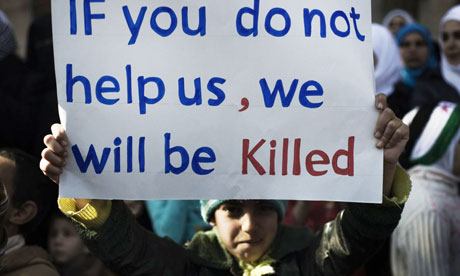On February 4, 2012 one of the saddest events in the history of the United Nations Security Council occurred. A resolution seeking to end the violent suppression of the pro-democracy movement in Syria and largely sponsored by the Arab League was vetoed by Russia and China. Though 13 out of 15 Security Council members voted in favor of the draft resolution, the fact that the objecting nations are permanent members of the Security Council meant that the latest effort by the UN to end the bloodbath in Syria was torpedoed.
Since China makes no pretense to being a democratic country, and has a consistent policy of not “interfering in the internal affairs” of other countries (and ensuring the issue of Tibet does not make it onto the agenda of the United Nations), it is not surprising that Beijing sided with the Bashar al-Assad dictatorship. However, since Moscow at least claims that it is a democratic country and is genuinely concerned about the plight of the Syrian people, the Kremlin’s stubborn defense of Bashar Assad is as inexplicable as it is cynical. In effect, Moscow is telling the suffering people of Syria, as they are being bombarded by heavy artillery, to “drop dead.”
While the city of Homs was being shelled into oblivion by the dictatorship in Damascus, simultaneously with the draft UN resolution being watered down to appease Russia’s “concerns” (specifying no military intervention was being authorized by the Security Council) the Russian foreign minister, Sergey Lavrov, was rationalizing with tortured nuance his government’s defense of the Assad crackdown on the Syrian people, seeking to equate the Syrian people’s resistance to the tyrannical Baathist regime to the violence of President Assad’s security forces. Thus, by seeking to halt the massacres being perpetrated by the Assad regime, the United Nations is “encouraging” violence, according to the policymakers in the Kremlin, whose views are amplified by Moscow’s state-controlled propaganda arm, Russia Today.
Since the views articulated by Lavrov are inherently illogical, one may ask what the true reason is for Moscow’s rigid support of one of the most brutally repressive regimes in the Middle East, at a time when the winds of change are blowing throughout the Arab world. It could be that Moscow wishes to preserve the Assad regime as a client state that has purchased billions of dollars worth of weapons (some of which are now being used by Assad against his own people). Some have theorized that the Kremlin fears that if the Assad regime falls, it will be replaced by an Islamist government, which would encourage Islamic separatist movements in Russia’s troubled Chechnya and Dagestan republics. What makes this reasoning questionable is that the most entrenched allies of the current regime in Damascus are the Islamic Republic of Iran and its Lebanese proxy, Hezbollah.
Mr. Lavrov may do well to reflect on a predecessor of his from Soviet times, Vyacheslav Molotov. It was Molotov, on behalf of Soviet dictator Stalin, who negotiated a non-aggression pact with Nazi Germany, unleashing the Second World War. When the Nazis unleashed their aggression against Western Europe in 1940, Molotov actually sent the German foreign minister a telegram indicating full support and understanding for the measures taken by Hitler. When German troops marched through Paris, Molotov congratulated the Nazis. One year later, the same army that conquered Western Europe with Moscow’s approval invaded Russia, and nearly destroyed the country.
The Kremlin’s policy in support of the bloodthirsty Assad dictatorship may be cynical. However, based on Russia’s own calamitous history of aligning with foreign tyrannies, it is certainly not wise and may in the end harm Moscow’s most vital interests irreparably.






